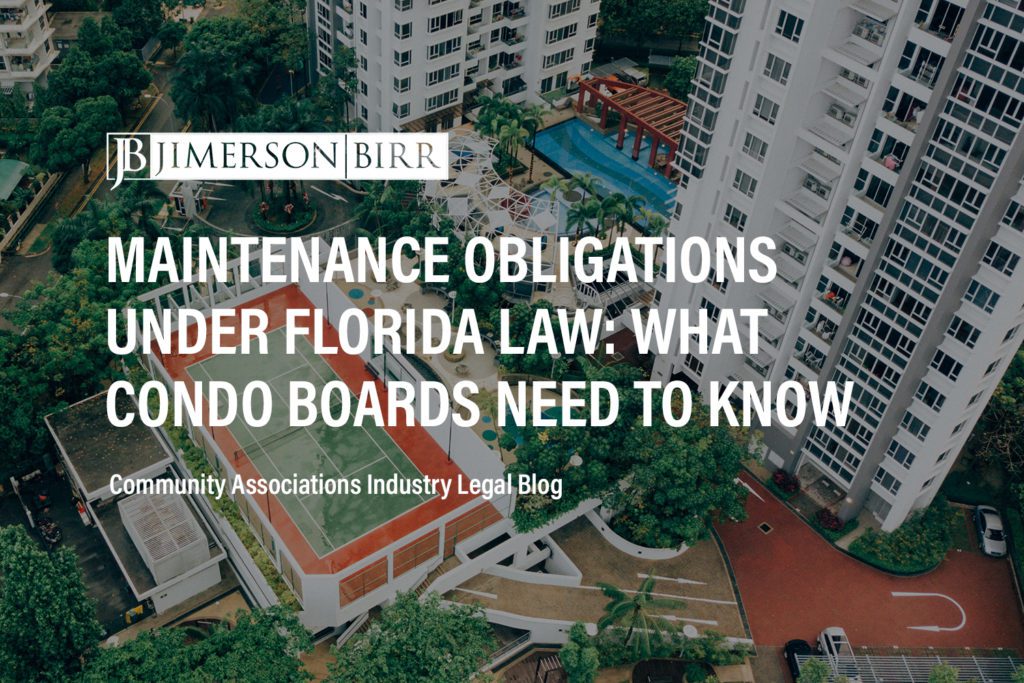Disputes over the party responsible for the maintenance of various areas of a condominium complex are common. Disagreements frequently arise between unit owners and an association over whether the association or the owner is responsible for the maintenance and upkeep of a particular area. This blog post provides an overview and summary of Florida law on the maintenance responsibilities of a condominium association as well as best practices condominium associations can take to meet these responsibilities and minimize liability exposure of association board members.
An Association’s Maintenance Obligations Under Florida Law
An association’s maintenance obligations primarily relate to common elements and are dictated both by statute and the condominium declaration. Fla. Stat. § 718.113 is one of the primary laws governing a condominium association’s maintenance obligations. Specifically, § 718.113(1) provides:
Maintenance of the common elements is the responsibility of the association. The declaration may provide that certain limited common elements shall be maintained by those entitled to use the limited common elements or that the association shall provide the maintenance, either as a common expense or with the cost shared only by those entitled to use the limited common elements…
Flat Stat. § 718.108 states that common elements include:
- Condominium property which is not included within the units.
- Easements though units for conduits, ducts, plumbing, wiring, and other facilities for the furnishing of utility services to units and the common elements.
- An easement of support in every portion of a unit which contributes to the support of a building.
- The property and installation required for the furnishing of utilities and other services to more than one unit or to the common elements.
A condominium association’s declarations might classify additional elements as common elements. Many declarations define common elements as everything beyond the interior walls of individual units. When a declaration does identify additional elements as common elements, the board is obligated to maintain these elements while acting on behalf of the association. Therefore, it is important for board members to have knowledge of what the declaration classifies as a common element so that the board can ensure such elements are being properly maintained.
Best Practices for Inspecting and Maintaining Common Elements
Various organizations and institutes are currently compiling data and conducting studies to determine best practices that condominium associations should take to prevent serious issues from occurring. Currently, it appears the only counties in Florida that require building re-inspections following condominium construction are Miami-Dade and Broward counties, both of which mandate that buildings be re-inspected forty (40) years after construction, then every ten (10) years thereafter.
As the Florida legislature and local governments work through the issue and come up with concrete inspection and maintenance requirements, Boards should be proactive and properly plan in order to mitigate issues before they become serious. Some examples of how a Board can be proactive include:
- Establishing an inspection checklist to ensure all common elements are inspected on an annual or other appropriate regular basis.
- Properly budgeting and establishing a healthy emergency fund to immediately address any major repairs.
- Hiring a Condominium Property Manager to manage the regular upkeep of association property.
Personal Liability of Board Members
Under Fla. Stat. § 718.111(1)(a), a condominium association is required to be registered with the state as a Florida corporation, either for-profit or not-for-profit. Board members typically are protected from most personal liability by the corporate structure. While the association can be held liable on negligence grounds, individual board members generally cannot. Additionally, board members usually avoid liability for business and rule-making decisions under the well-established “business judgment rule.”
Despite the strong personal liability protections for board members, there are certain situations where they can be held personally liable for their actions. Fla. Stat. § 718.303(d) allows for board members to be sued in their individual capacity if they willfully and knowingly fail to comply with the provisions of the Condominium Act. Furthermore, Fla. Stat. § 617.0834 allows for not-for-profit board members to be sued in their individual capacity if their actions constitute a criminal violation, were reckless, were committed in bad faith or with malicious purpose, or provided an improper personal benefits to the members themselves. While these actions set a much higher bar than negligence, board members should be careful that their actions do not trigger any such potential liability exposure.
Conclusion
Although association board members generally will avoid personal liability in lawsuits, they should make sure they fully understand what maintenance responsibilities the association has per its declarations, especially with respect to common elements, as well as any additional local mandates. The board members owe a fiduciary duty to all unit owners, and that includes carrying out the responsibilities of the association and not acting in a reckless or self-interested manner. Proactively planning, and establishing systematic and well-funded best maintenance practices, will help ensure that any required maintenance is taken care of promptly and help the association and its leaders avoid litigation.

